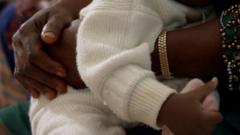Chioma, firmly cradling her son Hope, insists he is her biological child. After enduring eight years of infertility, she perceives Hope as a miracle in her life. However, her claim sparks disbelief from her husband Ike's family during an interrogation led by Ify Obinabo, Anambra state's commissioner for women affairs and social welfare. They are skeptical of Chioma’s assertion that she carried the child for 15 months.
Under immense pressure from Ike's family to reproduce, Chioma sought unconventional solutions, ultimately falling victim to a baby trafficking scam disguised as a fertility clinic. The BBC was permitted to document the commissioner’s inquiry into what has been identified as the "cryptic pregnancy" scam, which exploits women by preying on their motherhood desires—a situation exacerbated by societal expectations in Nigeria, characterized by high birth rates and significant stigma surrounding infertility.
BBC Africa Eye has been investigating this disturbing trend for over a year. The scam typically involves fraudsters posing as medical professionals who assure women they can achieve “miraculous” pregnancies through dubious treatments costing hundreds of dollars. Women report experiencing bodily changes, convincing them they are expecting when in fact, they are victims of manipulation.
When the time for what they believe is delivery arrives, the women face bizarre and often traumatic experiences. Some endure painful procedures without understanding the repercussions, while others wake up disoriented to discover their "birth" scars. Chioma recalls a painful delivery experience following an injection, but she refrains from sharing the full extent of her ordeal.
The investigation also branches into the operations of a woman identified as "Dr. Ruth," who runs a fraudulent fertility clinic in Anambra. Our undercover team, posing as hopeful parents, discovered an environment rife with false promises and dubious medical practices. During a visit, our reporters were offered injections and pills, along with an absurdley expensive treatment plan for supposedly inducing pregnancy.
The circumstances surrounding cryptic pregnancies are emboldened by a network of misleading information online, where women share anecdotes claiming improbable pregnancies while endorsing an unscientific narrative. Such misinformation has permeated platforms like Facebook, encouraging women from various regions, including the U.S. and South Africa, to fall for the false claims.
Authorities have recognized that vulnerable women are essential to fulfilling the demands of these scams, with newborns being sold to those seeking children through unlawful means. One woman, Uju, nearly sold her child after being bribed but was rescued by authorities during a raid on one of these clinics. The traumatic decisions placed before these women cast light on deeper societal failures regarding women's rights and reproductive health.
Commissioner Obinabo faces a challenging dilemma when questioning Chioma and ultimately decides to allow her and Ike to keep baby Hope, deeming them victims in the scam. She warns that without significant change in societal attitudes toward infertility and reproductive rights, these miscarriage-of-justice scenarios will persist.
For a more thorough exploration of this pressing issue, you can access the full documentary on iPlayer or YouTube.




















